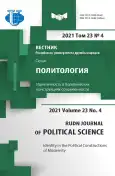Identity Politics and International Security of the Post-Soviet European States
- Authors: Fadeeva L.A.1, Plotnikov D.S.1
-
Affiliations:
- Perm State University
- Issue: Vol 23, No 4 (2021): Identity in the Political Constructions of Modernity
- Pages: 614-629
- Section: IDENTITY IN THE POST-SOVIET SPACE
- URL: https://journal-vniispk.ru/2313-1438/article/view/322098
- DOI: https://doi.org/10.22363/2313-1438-2021-23-4-614-629
- ID: 322098
Cite item
Full Text
Abstract
In the article, identity politics is understood as an intentional policy towards forcing and maintaining a macro-political identity. The authors also refer to the traditional understanding of identity politics as a political course focused on protecting the rights of oppressed (deprived) minorities. The object of the research is the European countries of the post-Soviet space. The authors emphasize the dominance of the international (European) vector of political identity, based on the position declared in official speeches and confirmed in the media and history textbooks. The authors identify several stages that determine the algorithm of identity politics in the Baltic countries, the Ukraine and Belarus. They give examples of how in modern conditions the reference to value orientations actualizes the classical understanding of identity politics, at the same time exacerbating the confrontation between the countries that have chosen the European vector and those who hesitate or do not have such a chance.
About the authors
Lyubov A. Fadeeva
Perm State University
Author for correspondence.
Email: polsci@yandex.ru
ORCID iD: 0000-0002-3389-750X
Doctor of Historical Science, Professor of the Political Science Department
Perm, Russian FederationDmitrij S. Plotnikov
Perm State University
Email: plotnikov.perm@mail.ru
ORCID iD: 0000-0001-6846-044X
PhD of Political Science of the Political Science Department
Perm, Russian FederationReferences
- Aron, R. (2000). Peace and war between nations. Moscow: Nota Bene. (In Russian).
- Bomsdorfa, F., & Bordugova, G. (Eds.). (2009). National stories in the post-Soviet space – II. Мoscow. (In Russian).
- Fabrykant, M. (2018). National identity in the contemporary Baltics: comparative quantitative analysis. Journal of Baltic Studies, 49(3), 305–331.
- Fadeeva, L.A., & Plotnikov, D.S. (2019). The experience of world wars in identity politics and building an international security strategy. In A.V. Akulshina (Ed.), Regional strategies for international security: Russia, the EU and the Middle East: Proceedings of an international scientific conference (pp. 213–238). Moscow: Scientific Consultant. (In Russian).
- Finko, A. (2005). Elections of 2004: main conflicts and their consequences. In “Orange revolution”. Ukrainian version. Moscow. (In Russian).
- Gromyko, A., & Fedorova, V.P. (Eds.). (2017). Europe of the XXI century. New challenges and risks. IE RAN SPB.: Nestor-Istoria. (In Russian).
- Hall, R.B. (1999). National collective identity: Social constructs and international systems. New York: Columbia University Press.
- Kaarbo, J. (2003). Foreign policy analysis in the twenty-first century: Back to comparison, forward to identity and ideas. International Studies Review, 5(2), 156–163.
- Kazancev, A.A., & Merkyszev, V.N. (2008). Russia and the Post-Soviet Space: Prospects for Using “Soft Power”. Polis. Political Studies, (2), 122–135. (In Russian).
- Kochetkov, A.P. (2010). Identity in international relations: theoretical foundations and role in world politics. Moscow University Bulletin of World politics, (1), 5–26. (In Russian).
- Kuchma, L.D. (2003). Ukraine is not Russia. Moscow. (In Russian).
- Lebow, R.N. (2016). National identities and international relations. Cambridge: Cambridge University Press.
- Manicom, J. (2013). Identity politics and the Russia-Canada continental shelf dispute: An impediment to cooperation? Geopolitics, 18(1), 60–76.
- Miller, A.I., & Efremenko, D.V. (Eds.). (2020). The politics of memory in modern Russia and the countries of Eastern Europe. Actors, Institutions, Narratives. St. Petersburg: Publishing House of the European University in St. Petersburg. (In Russian).
- Miniotaite, G. (2003). Convergent geography and divergent identities: A decade of transformation in the Baltic states. Cambridge Review of International Affairs, 16(2), 209–222.
- Mironenko, V.I. (2020). Ukrainian transit. Situation analysis experience. Moscow: Institute of Europe. (In Russian).
- Nemenskiy, O.B. (2016). “The Last Ally” Russian-Belarusian relations at the present stage. Outlines of Global Transformations: Politics, Economics, Law, 9(5), 24–40. (In Russian). DOI: https://doi.org/10.23932/2542-0240-2016-9-5-24-40
- Pohrebinskiy, M.B., & Tolpygo, A. (Eds.). (2006). Ukraine without Kuchma. The Year of the Orange Power. January 2005 – March 2006. Kiev: Optima. (In Russian).
- Popova, O.V. (2020). Unresolved problems in the theory of state identity policy in Russian political science. Political science (RU), (4), 86–110. DOI: http://www.doi.org/10.31249/poln/2020.04.05
- Raik, K. (2016). Liberalism and geopolitics in EU–Russia relations: Rereading the “Baltic factor”. European Security, 25(2), 237–255.
- Semenenko, I.S. (Ed.). (2017). Identity. Personality. Society. Politics. Encyclopedia edition. Moscow: Ves Mir. (In Russian).
- Shmelev, В.A. (2021). The reasons of the confrontation between Russia and the Ukraine. Post-Soviet Issues, 8(1), 33–53. (In Russian). DOI: https://doi.org/10.24975/2313-8920-2021-8-1-33-53
- Trenin, D. (2021). A new balance of power. Russia in search of foreign policy balance. Moscow: Alpina Publisher. (In Russian).
- Vitkus, G. (2019). Trilemmas of recognition in the Baltic states’ foreign policies. Journal of Baltic Studies, 50(3), 307–326.
- Vucetic, S. (1996). Identity and Foreign Policy. In J. Katzenstein (Ed.), The culture of national security: Norms and identities in world politics. New York: Columbia University Press.
Supplementary files









